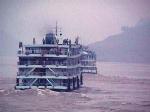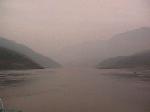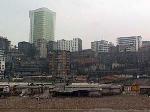- Getting around Lijiang. Dont stay in the Old Towns more than 2 days, there is nothing to do. KRISS Oct 9, 2013 05:46
- 2013 Beijing Temple Fair BENNYLAU Feb 26, 2013 03:29
- Malaysian traveling from KUL - LAX vis Shanghai PVG ZATI_DY Jan 3, 2013 20:15
The River - Part One - Onto the Yangtze
- Views: 4469
- |Vote: 0 0
- |Add to Favorites
- |Recommend to Friends
Death and Glory on the Yangtze
As Paul Theroux, the well-known travel writer once observed, "there is no Yangtze River". The river known to the rest of the world by this name is principally referred to in China as Chang Jiang, which means 'The Long River', and this is perhaps because it is China's greatest river. The Yangtze drains from China's remote West and carves a deep channel right throughout the country to Shanghai in the East. For centuries it has nurtured Chinese civilisation; commerce along the river has been instrumental in China's cultural development. 1500 years ago it was a vital part in the continuing unification of China when it was connected by canal to the Yellow River in the North. The man-made canal is both the oldest and the longest in the world, and is itself a project on the scale of the Great Wall. Despite this extraordinary role in China's development, the Long River is a harsh matriarch, a mother of incessant floods that have swept away its children for hundreds of years; indeed, many travellers have reported witnessing bodies floating downstream, such a commonplace sight for locals on the river that they are often ignored.
It's easy to underestimate what the Yangtze means to Chinese people. Chinese people take a deep sense of pride in their own history, and the Yangtze is such a fundamental part of China's past that few Chinese fail to feel a certain awe or respect for it. It is the first sight that Chinese travellers want to see if they've not seen the river before. Many cities through which the river passes have erected observation towers, in which numerous plaques of poetry are on display, all by ancient and celebrated bards, and dedicated to the river. Many take advantage of the travelling seasons to take a ferry along the river just as Lao Hei and I were doing, perhaps even more so in recent years with the impending construction of the Three Gorges Dam at Yichang.
The dam is intended to be the greatest ever built, yet its construction is almost universally opposed by observers outside of China, and defended by Chinese, both sides with an almost religious fervour. Opinions on the dam now overshadow all commentary which remotely involves the Yangtze River. The issue emerges in films and dramas about China, books, impassioned speeches by Western missionaries of conservation. The main consensus of foreign experts is that the ecological damage caused by the construction of the dam far outweighs the claimed benefits. In particular, the scenic area of the river which lends its name to the dam - the Three Gorges - will be greatly affected as its valleys fill and its peaks are gradually submerged in the cloudy water, already muddy and clogged with silt let into the river as part of the natural process of civilisation and construction on the banks. This is an opinion that is not generally shared by the folk who live in the vicinity of this dangerous river.
The Three Gorges are widely held as one of the most tranquil and scenic, and even spectacular spots along the riverside, and there seems to me to be a very confused emotion towards the flooding of the area amongst the Chinese people I've asked about the issue. Everybody I've spoken with on the matter in China thinks that the dam is a great idea, and yet at the same time also thinks that the Three Gorges are a priceless scenic attraction with an undeniable historical importance. There seems to be an uncanny willingness amongst Chinese to see the Three Gorges sink when the dam is completed in 2009 despite their sentimentality for it. Perhaps the answer to the apparent contradiction is the weariness that the Chinese have with fighting the river, which sometimes seems to take more than it gives. Every year the river takes not only lives, but homes and villages and food; the river is a monster and an opportunity to conquer it once and for all seems miraculous. One might venture that Chinese people are greatly strengthened in morale by the prospect of the dam, one which proves once again the power of Chinese people to erect control over their nation's destiny on a massive scale. The dam, when viewed from this perspective, is clearly in the tradition of the Great Wall and the Grand Canal. Foreign opponents who point out that the river might be even more efficiently controlled by a series of smaller and more modest dams have not penetrated the Chinese fascination, for better or worse, with magnificence.
Setting Out
The trip Lao Hei and I were taking along the river would bring us through the Three Gorges, and right along to Yichang where the dam is being built. This was one of the highlights of our adventure through Central China, and we had read up on the region in an attempt to prepare for what we would witness. If the river is part of the soul of China, then a trip along the Yangtze should not be thought of as a regular voyage, but as something of a pilgrimage. The riverside is liberally sprinkled with small oily towns that without the river would be as remote as any other city on Earth deep in mountainous countryside. They feed off as much as fend off the waters, they are dizzy in tradition, superstition and spiritualism, and yet have very strong and real connections with the new emerging economy of metropolitan China. A voyage along the Yangtze is reported therefore to be nothing short of fascinating.
However it was possibly more the lack of sleep which contributed to the initial charmed atmosphere of the river as we set out from Chongqing. We had spent the entire night wandering the mazework of the city, and were moved with the sights of many secret and ordinary things. As we sat in the passenger terminal, slowly filling with edgy early-risers waiting for the boats, I began to feel heavy, Lao Hei collected our bags and we sat in one of the massive gondolas lifting a crowd of passengers down the steep cliff banks of Chongqing to the ferry. We quickly found the inexpensive bunks we had booked - forty people to a room. We hadn't wanted to be pampered foreigners, just normal passengers, being with the locals. Nothing to apologise for. And it was of no consequence that the beds were simple stacked bunks - we were asleep within seconds.
We must have slept half the day away. When we walked out, the sky was dark in cloud, although it was still hours away from nightfall. The river was oppressively gloomy, a brown-gray mass of water moving sullenly under the cloud. The banks sloped slowly away from the shores, we were already a century away from Chongqing and the passing junks slopped paddles into the lifting swell.
Our lower-class cabin was one of a file of identical bunkrooms on the bottom deck of the ferry. The ferry itself was a wedding-cake of thick old sheds, four layers of sturdily tacked-together wood and iron: despite wear, a good ship. Out on deck, the passengers were wandering around and leaning over the balconies watching the passing murkiness. They seemed hesitant to climb up to the upper levels, perhaps embarrassed to be told off by third or second class passengers. I was keen to explore and took the risk. One advantage of being a foreigner is that it's very easy to get away with that sort of thing. Suitably foreign-looking tourists can wander through all manner of hotel, party or restaurant in China; and although I'm normally of the mind to be vocally against that sort of thing (for reasons which have yet to come to light), I was in need of a shower, and sharing the spartan no-doors nudey room with several other curious males (as Lao Hei tried and suffered the consequential stares) was something I hoped to avoid if at all possible. I was lucky - after passing the hall of super lower-class passengers (sleeping on newspapers in a lobby) I found a corridor of single-room showers, lockable from the inside, with limitless hot water. More than a backpacker (were I a genuine backpacker) could hope for.
Passing Cities
The second level had a comfortable lounge room at the front which Lao Hei and I examined later. We were not the only lao wai on the ferry, a pair of English girls who thought that they were sailing the whole length of the river by travelling all the way to Shanghai were on this vessel for a cheap & genuine China experience. We didn't have the heart to tell them that by getting on at Chongqing they'd missed half the river, which stretches way back into Qinghai/Tibet. We ourselves were planning to get off the boat at Yichang, the city on the Three Gorges Dam. A few other Chinese gentlemen populating the lounge were moderately better off than their counterparts downstairs, and seemed to be really interested in seeing the Three Gorges, having taken the boat as an economical pilgrimage rather than a mere means of transport.
The afternoon passed slowly. The unbroken low slopes of scrub and rock would occasionally give way to settlements, some of which were large and drab cities. From the river, China seemed to lean down into the waters with great reluctance. The banks stooped up on both sides, and gray empty-looking blocks sadly perched on the stone like inner-city carpark buildings. Floating through a motionless dim mist, Lao Hei and I looked out over the other boats and ferries on the river that seemed to dock and pull away from the occasional congestion of rivercraft in a kind of slow motion.
We had expected that our ferry would stop a lot more times than it did. Our (by now largely ignored) guidebook had mentioned that the river ferries regularly made anchorstops at several of the many cities along the Yangtze, at each of which it was possible to disembark and explore for half an hour or so. Actually, our boat only ever pulled in once at a port, by which stage it was beginning to get dark. Lao Hei and I stood out on a floating iron pier as crates were lifted back and forth from the cargo hold. There were a few stalls in the lamplight, tables of oily meats and pistachio nuts - we settled for a couple of bread buns, even though they were sure to be ruined with red bean paste, and made back for the bunkrooms. The passengers weren't ones for wandering the ship at night, and the majority of bunks were already populated with dark-suited men and women with thick socks, sitting on their bunks, chatting, smoking and eating sunflower seeds. I had had the intention of taking some moments alone up on the top deck to watch Central China go past at night, but despite the abnormal hours, and the cigarette smoke, and the noise, I slept again; and Lao Hei, lying reading on his bunk, soon did the same.






 Copyright © 1998-2026 All rights reserved.
Copyright © 1998-2026 All rights reserved.